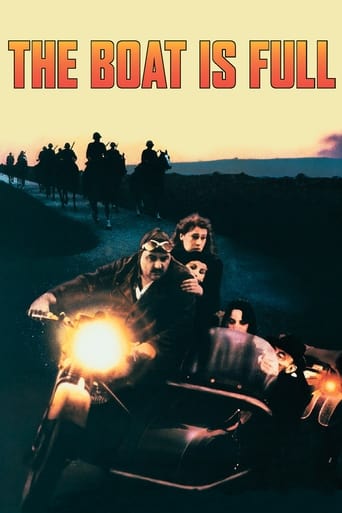David Bogosian
When the von Trapp family make it over the border to Switzerland, their ordeal is over and all is well (or so "Sound of Music" implies). Not so with the six forlorn refugees of "The Boat is Full." Having reached Switzerland after a perilous escape from Nazi Germany, their ordeal has just begun. They end up in a small village where an innkeeper couple take them in and try their best to provide food, clothing, shelter, and protection from the authorities.The movie examines the attitudes of the Swiss towards refugees who were escaping Germany and seeking safety in their country. It provides a good insight not only into the official policies regarding which refugees were allowed to stay and which were forced to be repatriated, but also the attitudes of the common people. Some were openly hateful, most were indifferent and callous, many genuinely compassionate and kind.The overall arc of the story is less important with this movie than the individual scenes and episodes that take place. Each conveys a particular pathos and engraves itself in one's memory with indelible force. The acting is almost totally transparent: you feel these are real people going through real events. The refugees' blank, despondent expressions, the gradual transformation of the innkeeper husband from suspicion to tolerance to outright kindness, the harsh authoritarian attitudes of the policeman, these all contribute to the film's effect. It's a stark film to watch: there is no score, the colors are heavily muted and drab, and there are few points of comfort or cheer. One is left with a profoundly ambivalent view of the Swiss and Switzerland, which apparently was known as the "lifeboat" of central Europe (hence the irony in the title). The film is basically examining where the line could/should have been drawn between compassion and the need to maintain Swiss neutrality and protect its own borders and feed its people.
beatle1909
I hated most of the characters in this movie. I hated the ending. I had trouble sleeping after I saw the film. A movie that affected me this much, must be brilliant. It is! In all its aspects. Simple storytelling at its best. A shame, and a sin, that it is all true. And you know it cuts right to the bone, after you become aware, as to how the movie was shunned in Switzerland, and how all but one print of the film managed to survive, after its initial release. Thank you, thank you, thank you, to the filmmakers and actors that made the Boat is Full, a reality. I have seen quite a few films, relating to the Holocast, and this is by far the the most horrific. As I said before, simple, yet effective.
Howard Schumann
In 1996 a panel was created called the Independent Commission of Experts headed by historian Jean Francois Bergier to study Switzerland's wartime past. The report of the Bergier Commission, though acknowledging the many refugees Switzerland accepted during 1940-45, condemned its wartime practices of deporting Jewish refugees (around 30,000) back to Germany, accusing Swiss officials of pursuing an inhumane policy at odds with the country's tradition of offering asylum to those facing persecution. A Swiss/Austrian/West German co-production, Markus Imhoof's striking drama The Boat is Full dramatizes this issue, challenging myths about Swiss wartime virtue and innocence.Nominated for an Oscar in 1982 for Best Foreign Film, The Boat is Full is not widely known in the U.S. but it is one of the finest films dealing with the holocaust. In the film, a group of German Jewish refugees must pretend they are a family in order to be granted asylum in Switzerland (refugee families with children under 6 are allowed to remain in Switzerland) but are faced with the rigidity of small-minded bureaucrats who see it as their duty to uphold the letter of the law. As the film opens, a German train is halted because of a Swiss attempt to wall off the tunnel to close potential escape routes. Six people, four Jews, a French child, and a deserting German soldier jump off the train and seek refuge at a rural inn, run by a married couple Laurent and Franz Fluckiger (Renate Steiger and Mathias Gnadinger). It is only afterwards that they discover that the country maintains strict quotas and that they are in danger of being deported.To survive, they pose as a family. Judith Kruger (Tina Engel), a young woman, pretends that she is the wife of Karl Schneider (Gerd David), a Nazi deserter, an elderly man from Vienna, Lazar Ostrowskij (Curt Bois) pretends to be her father, and a young boy (Simone Maruice), who can only speak French, pretends that he is a deaf mute. The scheme is threatened, however, when a hard-nosed constable comes to investigate and Judith's real husband escapes from a work camp and tries to find her. Though we do not know the protagonists on other than a surface level, The Boat is Full is still a powerful film that reminds us that rigidly supporting the letter of the law does not always mean adhering to its spirit, or understanding the personal consequences that may result.
Mort-31
This is a rather small movie, realistic, concentrating on its people. German and Austrian refugees come to Switzerland, find shelter at a countryhouse and experience that they are not really wanted there because the Swiss have their own problems yet they are not in war. It's a dense movie, with authentic actors and simple but convincing dialogues.The fact that it ends up not in one big but in some smaller singular tragedies is not particularly stressed; the true story the movie is based upon is told plainly, without cinematic flamboyance and therefore the movie gains a somewhat disturbing, unpleasant touch. Actually, this is the first Swiss World War II movie I've seen and it was interesting to get to know their point of view too. I recommend this.


